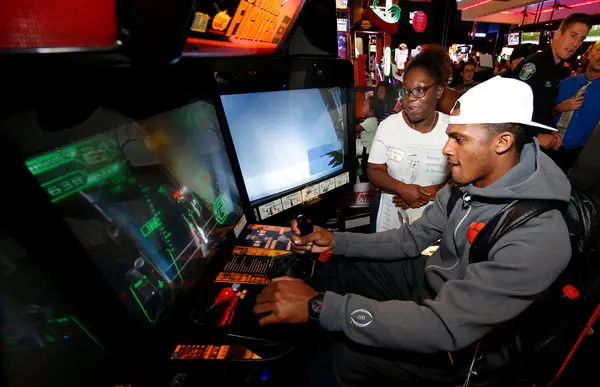Video games today go far beyond entertainment, serving as powerful tools for learning, personal development, social connection, and even mental health support. The medium has evolved to offer rich, meaningful experiences that can positively impact players in surprising ways. Here are some ways video games contribute to growth and well-being, transforming them into much more than just a fun pastime:
1. Educational Value
- Many video games incorporate complex problem-solving and strategic thinking, helping players develop skills that are valuable in real life. Educational games like Minecraft: Education Edition, Kerbal Space Program, or Civilization encourage learning about subjects such as math, physics, history, and critical thinking. The engaging nature of games allows players to retain knowledge better, making learning enjoyable and effective.
2. Improved Cognitive Abilities
- Studies show that action and puzzle video games can improve cognitive functions, including memory, spatial awareness, and multitasking skills. Games requiring quick reactions and strategic decision-making, like Portal or StarCraft, train the brain to process information faster and make accurate judgments under pressure. These skills translate to real-life applications, making games valuable for mental acuity.
3. Social Connection and Community
- Online games provide a platform for social interaction, fostering friendships and communities worldwide. Multiplayer games such as Fortnite, World of Warcraft, and Animal Crossing allow players to collaborate, compete, and build relationships. For many, these connections are meaningful and help combat loneliness, offering a support system within the gaming community. Gaming can even bridge cultural gaps, as people from different backgrounds connect over shared experiences.
4. Mental Health Benefits
- Certain games and gaming activities can serve as a mental health resource. Games like Journey, Celeste, and Gris explore themes of resilience, loss, and self-acceptance, allowing players to reflect on their emotions. Additionally, some games are used in therapy to help manage stress, anxiety, and depression, as they provide a safe space for expression and distraction. Games designed for mindfulness and relaxation, like Kind Words or Stardew Valley, offer comforting experiences that can promote mental well-being.
5. Physical Rehabilitation and Therapy
- Games are increasingly used in physical rehabilitation for patients recovering from injuries or dealing with conditions that affect mobility. Motion-controlled games, like those on the Nintendo Wii or with VR setups, are used in therapy to engage patients in physical activity, improving coordination and motor skills. Gamified exercises make the rehabilitation process enjoyable, helping patients stay motivated and achieve better results.
6. Career Opportunities and Skill Development
- Gaming can also be a pathway to career opportunities. From esports to game development, streaming, and content creation, gaming offers many professional avenues. Additionally, skills developed through gaming—such as teamwork, communication, strategic thinking, and technical expertise—are transferable to other fields. Some companies even recognize gaming experience as a sign of valuable soft skills.
7. Promoting Empathy and Understanding
- Certain games are designed to foster empathy by placing players in different perspectives. Titles like Life is Strange, That Dragon, Cancer, and This War of Mine allow players to experience challenging human experiences and dilemmas, often encouraging greater empathy and understanding. These games highlight social issues, creating awareness and compassion for situations players may not have encountered otherwise.
8. Encouraging Physical Activity with VR and AR
- Virtual and augmented reality games, such as Beat Saber and Pokémon GO, combine physical activity with gaming, promoting exercise in a fun way. VR games often require movement, helping players stay active while enjoying better experiences. AR games encourage outdoor exploration, bridging the digital and physical worlds to create a more active gaming experience.
9. Boosting Creativity
- Games that encourage creation, like Minecraft, The Sims, or Dreams, enable players to build, design, and imagine worlds of their own. These games give players a sense of control and expression, encouraging creativity in a low-pressure environment. This freedom to experiment and innovate can boost players’ creative skills and confidence in other areas of life.
10. Encouraging Teamwork and Leadership
- Multiplayer games often require teamwork, communication, and strategy to achieve goals, fostering cooperation and leadership skills. Players often take on roles that require coordination, empathy, and managing group dynamics. Games like Overwatch, League of Legends, and DOTA 2 necessitate real-time teamwork and strategic leadership, which can translate into valuable experience for handling collaborative tasks outside of gaming.
11. Stress Relief and Relaxation
- Games provide an accessible way to relax and relieve stress, offering a temporary escape from daily pressures. Engaging in a favorite game can help players recharge, offering an outlet to unwind and reset. Games with calming aesthetics and music, such as Animal Crossing and Abzû, are especially effective for promoting relaxation.
12. Personal Growth Through Challenge and Reward
- Video games often simulate goal-setting, resilience, and perseverance by presenting players with challenges that can only be overcome through repeated effort. Games with a high difficulty curve, such as Dark Souls or Hades, encourage players to learn from their mistakes and build resilience, which can foster perseverance and a growth mindset.
Video games are an evolving medium with applications that extend far beyond entertainment. From supporting mental health to fostering social connections, these experiences have a tangible impact on players, making gaming a meaningful and influential part of modern life.

